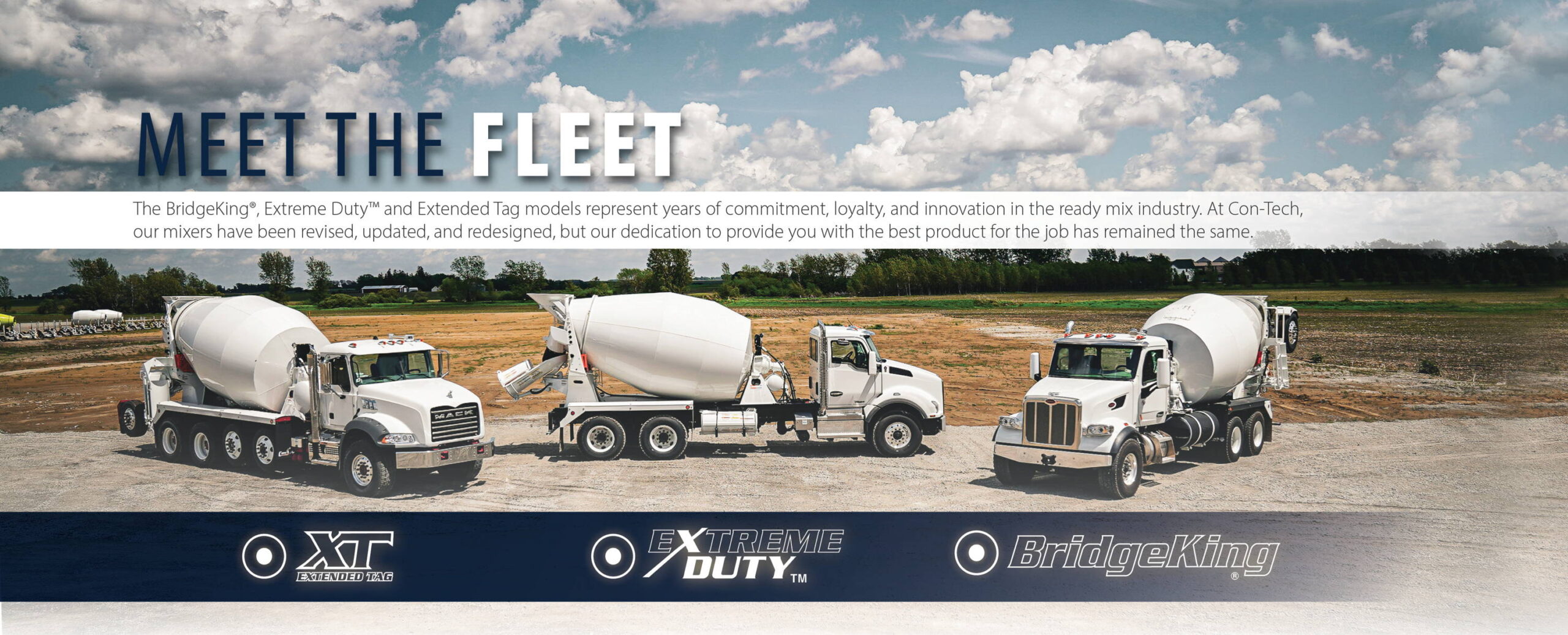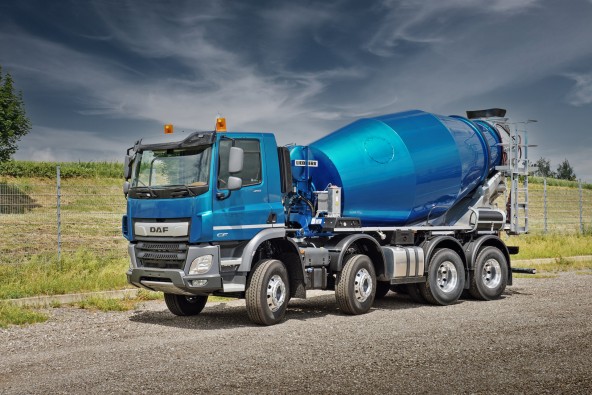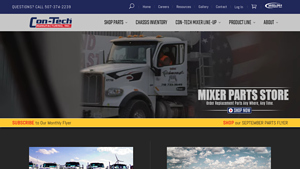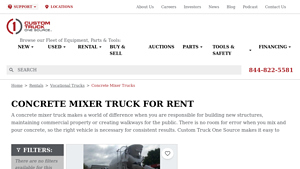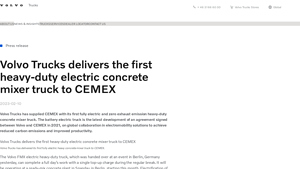Introduction: Navigating the Global Market for concrete Mixer Truck
In an increasingly competitive landscape, navigating the global market for concrete mixer trucks presents significant challenges for international B2B buyers. Whether you’re sourcing a fleet for large-scale construction projects in Brazil or expanding operations in the Middle East, the complexities of choosing the right mixer truck can be daunting. With various types, from volumetric to front and rear discharge models, understanding the specific applications and functionalities is crucial to making informed purchasing decisions.
This comprehensive guide serves as an essential resource, empowering buyers with the knowledge needed to confidently navigate the complexities of the concrete mixer truck market. We delve into the different types of mixer trucks available, their applications across diverse industries, and critical factors to consider when vetting suppliers. Additionally, we provide insights on cost considerations, ensuring you can effectively budget for your investment.
By addressing the unique challenges faced by B2B buyers in regions such as Africa, South America, Europe, and the Middle East, this guide aims to streamline your sourcing process. It equips you with actionable insights that can lead to more strategic purchasing decisions, ultimately enhancing operational efficiency and project success.
Understanding concrete Mixer Truck Types and Variations
| Type Name | Key Distinguishing Features | Primary B2B Applications | Brief Pros & Cons for Buyers |
|---|---|---|---|
| Front Discharge Mixer | Front-mounted drum for direct pouring | Urban construction, road work | Pros: Enhanced maneuverability, precise placement. Cons: Higher initial cost, requires skilled operators. |
| Rear Discharge Mixer | Standard design with rear discharge chute | General construction, large-scale projects | Pros: Versatile for various job sites, easier maintenance. Cons: Limited visibility for the driver. |
| Volumetric Mixer | On-site mixing capabilities with adjustable ratios | Remote projects, small batch needs | Pros: Reduces waste, flexibility in material ratios. Cons: Higher complexity, requires training for operation. |
| Agitator Truck | Primarily transports pre-mixed concrete without mixing | Long-distance transport, large-scale pours | Pros: Efficient for long hauls, maintains concrete quality. Cons: Limited to specific applications, less versatile. |
| Specialized Mixer | Custom configurations for specific materials or needs | Specialty construction, unique projects | Pros: Tailored to specific requirements, enhanced performance. Cons: Potentially higher costs and lead times. |
What Are the Key Characteristics of Front Discharge Mixers?
Front discharge mixers are equipped with a drum positioned at the front of the truck, allowing for direct and precise pouring of concrete. This design is particularly beneficial in urban construction sites where space is limited and precision is crucial. B2B buyers should consider the need for skilled operators, as maneuvering and pouring require experience. Additionally, while the initial investment is higher than traditional mixers, the operational efficiency can justify the cost in high-density areas.
How Do Rear Discharge Mixers Function in Construction?
Rear discharge mixers are the most common type, featuring a rear-mounted drum that discharges concrete through a chute. Their versatility makes them suitable for a variety of construction applications, from residential builds to large infrastructure projects. Buyers should weigh the ease of maintenance against the limited visibility for drivers, which can affect safety on busy job sites. The standard design also means they are widely available, providing options for both new and used purchases.
Why Choose a Volumetric Mixer for Your Projects?
Volumetric mixers are unique in their ability to mix concrete on-site, allowing for precise control over material ratios. This capability is especially advantageous for remote projects or when small batches are required. B2B buyers should consider the complexity of operation, as these mixers necessitate trained personnel to manage the mixing process effectively. Although they may come with a higher price tag, the reduction in waste and increased flexibility often outweigh the initial costs.
What Are the Benefits of Using Agitator Trucks?
Agitator trucks are designed for the transportation of pre-mixed concrete without additional mixing. They are ideal for long-distance transport where maintaining the quality of the concrete is paramount. Buyers should note that while they are efficient for long hauls, their application is limited to transporting concrete rather than mixing it on-site. This can affect flexibility in project management, particularly in dynamic construction environments.
How Do Specialized Mixers Cater to Unique Needs?
Specialized mixers are tailored for specific materials or construction needs, offering enhanced performance for unique projects. These mixers can accommodate various types of materials beyond standard concrete, making them suitable for niche applications. B2B buyers should consider the potential for higher costs and longer lead times when sourcing specialized equipment. However, the benefits of having a mixer designed for specific requirements can lead to improved efficiency and project outcomes.
Key Industrial Applications of concrete Mixer Truck
| Industry/Sector | Specific Application of concrete Mixer Truck | Value/Benefit for the Business | Key Sourcing Considerations for this Application |
|---|---|---|---|
| Construction | Ready-mix concrete delivery to job sites | Ensures timely supply of concrete, improving project timelines | Evaluate truck capacity, mixing technology, and reliability |
| Infrastructure | Road and bridge construction | Facilitates large-scale projects with consistent concrete quality | Consider local regulations, truck durability, and maintenance support |
| Residential Development | Foundation and structural work for homes | Provides necessary concrete for foundations, enhancing safety | Assess the mixer’s versatility, ease of operation, and availability of parts |
| Precast Concrete Industry | Production of precast elements | Streamlines production processes, reducing labor costs | Look for specialized mixers with volumetric capabilities and efficient mixing systems |
| Mining and Industrial | Concrete for infrastructure in mining operations | Supports safe and stable structures in challenging environments | Focus on truck adaptability to rugged terrains and payload capacity |
How is a Concrete Mixer Truck Used in the Construction Industry?
In the construction sector, concrete mixer trucks are vital for delivering ready-mix concrete directly to job sites. They ensure that construction projects receive timely and consistent concrete supplies, which is essential for maintaining project schedules. For international buyers, especially in regions like Africa and South America, it’s crucial to source trucks that can withstand varying road conditions and have adequate capacity to meet large project demands. Reliability and efficient mixing technology are critical factors to consider.
What Role Does a Concrete Mixer Truck Play in Infrastructure Development?
In infrastructure projects, such as road and bridge construction, concrete mixer trucks are used to transport large volumes of concrete. They help ensure the quality of concrete remains consistent, which is vital for structural integrity. Buyers should consider sourcing trucks that comply with local regulations and standards, particularly in the Middle East and Europe, where stringent quality controls are often enforced. Additionally, durability and ease of maintenance are essential to minimize downtime on extensive projects.
How Do Concrete Mixer Trucks Support Residential Development?
For residential development, concrete mixer trucks are essential for providing the concrete needed for foundations and structural work. They enable builders to pour concrete efficiently, ensuring that homes are built safely and to code. Buyers in regions like Vietnam and Brazil should assess the mixer’s versatility and ease of operation, as well as the availability of spare parts and service support, to ensure long-term reliability in their operations.
Why are Concrete Mixer Trucks Important for the Precast Concrete Industry?
In the precast concrete industry, mixer trucks are utilized for producing precast elements such as beams, panels, and blocks. This application streamlines the production process, allowing manufacturers to optimize labor and reduce costs. For buyers, it is crucial to look for mixers equipped with volumetric capabilities and efficient mixing systems that can handle various concrete mixtures, ensuring high-quality precast products that meet market demands.
How Do Concrete Mixer Trucks Benefit the Mining and Industrial Sectors?
Concrete mixer trucks are increasingly used in mining and industrial applications to provide concrete for infrastructure like access roads, support structures, and containment areas. These environments often present challenging conditions, requiring trucks that can adapt to rugged terrains while carrying heavy payloads. Buyers should prioritize sourcing trucks with robust designs and high payload capacities to ensure operational efficiency and safety in demanding environments.
3 Common User Pain Points for ‘concrete Mixer Truck’ & Their Solutions
Scenario 1: Managing Equipment Downtime During Projects
The Problem: In the competitive construction landscape, delays due to equipment failure can significantly impact project timelines and budgets. B2B buyers often face the frustration of unexpected downtime with concrete mixer trucks, which can be caused by inadequate maintenance, lack of spare parts, or outdated technology. For buyers in regions with limited access to reliable service centers, this issue becomes even more pressing, as every hour lost translates to increased costs and potential client dissatisfaction.
The Solution: To mitigate downtime, buyers should prioritize sourcing mixer trucks from reputable manufacturers that offer comprehensive warranties and robust after-sales support. When selecting a truck, consider models known for their reliability and availability of parts, especially if operating in remote areas. Establish a regular maintenance schedule that aligns with the manufacturer’s recommendations and invest in training for operators on proper truck handling to prevent wear and tear. Additionally, consider investing in telematics technology that can provide real-time diagnostics, alerting operators to potential issues before they lead to significant downtime. This proactive approach not only keeps projects on track but also enhances overall fleet efficiency.
Scenario 2: Ensuring Quality of Mixed Concrete
The Problem: Another common pain point for B2B buyers is the challenge of ensuring that the concrete delivered from mixer trucks meets the specified quality standards. Variations in mixing times, temperature, and the materials used can lead to inconsistencies that compromise the structural integrity of construction projects. This issue is particularly critical in regions where temperature fluctuations are significant, impacting the curing process and overall quality.
The Solution: To address this, buyers should invest in mixer trucks equipped with advanced volumetric mixing technology, which allows for real-time adjustments to the mix based on environmental conditions and project specifications. This technology enables operators to customize the concrete mix on-site, ensuring optimal consistency and performance. Furthermore, establish a quality assurance protocol that includes regular testing of concrete samples for compliance with industry standards. Collaborate with suppliers to ensure that the materials used are of high quality and suitable for local conditions. By focusing on these aspects, buyers can ensure that their concrete meets or exceeds project requirements, reducing the risk of costly rework.
Scenario 3: Navigating Compliance and Regulatory Challenges
The Problem: Compliance with local regulations regarding construction materials and environmental standards can be a daunting task for B2B buyers. Different countries and regions have varying laws that govern the use of concrete, including restrictions on emissions from mixer trucks and requirements for using recycled materials. Failing to adhere to these regulations can result in fines, project delays, and damage to the company’s reputation.
The Solution: Buyers should conduct thorough research to understand the regulatory landscape in their operating regions before purchasing mixer trucks. This includes seeking advice from local industry associations and regulatory bodies. When selecting a mixer truck, opt for models that are designed to comply with the latest environmental standards, such as those with lower emissions or those that can utilize alternative fuels. Additionally, work closely with suppliers to ensure that the concrete mix designs meet local regulations regarding recycled content and other sustainability requirements. By proactively addressing compliance issues, buyers can avoid penalties and position themselves as responsible, environmentally-conscious players in the market.
Strategic Material Selection Guide for concrete Mixer Truck
What Are the Key Materials Used in Concrete Mixer Trucks?
Concrete mixer trucks are critical in the construction industry, and the choice of materials significantly impacts their performance and durability. Here, we analyze four common materials used in the manufacturing of concrete mixer trucks, focusing on their properties, advantages, disadvantages, and considerations for international buyers.
How Does Steel Benefit Concrete Mixer Trucks?
Key Properties: Steel is renowned for its high tensile strength and toughness, making it an ideal material for the structural framework of mixer trucks. It can withstand high pressure and temperature variations, which is crucial for transporting concrete.
Pros & Cons: The primary advantage of steel is its durability and resistance to deformation under heavy loads. However, it is susceptible to corrosion, especially in humid or saline environments, which can lead to increased maintenance costs. Additionally, while steel is relatively inexpensive, the costs can escalate when considering protective coatings or treatments.
Impact on Application: Steel’s strength makes it suitable for heavy-duty applications, including the chassis and drum of the mixer. However, its weight can affect fuel efficiency, which is a critical consideration for buyers in regions with high fuel costs.
Considerations for International Buyers: Buyers in Africa and South America should consider the availability of steel and local regulations regarding its use. Compliance with international standards like ASTM and DIN is crucial to ensure safety and performance.
What Role Does Aluminum Play in Mixer Trucks?
Key Properties: Aluminum is lightweight and has excellent corrosion resistance, making it a popular choice for various components in mixer trucks, including the drum and body panels.
Pros & Cons: The lightweight nature of aluminum enhances fuel efficiency and payload capacity. However, it has lower tensile strength compared to steel, which may limit its use in high-stress applications. Additionally, aluminum can be more expensive than steel, impacting overall project budgets.
Impact on Application: Aluminum is particularly beneficial in regions where fuel efficiency is paramount, as it reduces the overall weight of the vehicle. However, its lower strength may limit its use in certain structural components.
Considerations for International Buyers: Buyers in the Middle East and Europe may prefer aluminum for its corrosion resistance, especially in coastal areas. Compliance with local standards and regulations regarding aluminum use is essential.
How Does Composite Material Enhance Performance?
Key Properties: Composite materials, often made from a combination of fiberglass and resin, offer high strength-to-weight ratios and excellent corrosion resistance.
Pros & Cons: Composites are lightweight, which can significantly improve fuel efficiency and reduce wear on the vehicle. However, they can be more expensive to manufacture and repair compared to traditional materials. Additionally, the manufacturing process can be complex, requiring specialized skills.
Impact on Application: Composites are particularly advantageous in applications where weight reduction is critical, such as in urban environments with heavy traffic. Their resistance to corrosion makes them suitable for various climates.
Considerations for International Buyers: Buyers in Europe and South America should assess the availability of composite materials and the associated manufacturing capabilities. Understanding local regulations regarding composite use is also vital.
What Are the Advantages of Using High-Strength Concrete?
Key Properties: High-strength concrete is designed to withstand greater loads and offers excellent durability and resistance to environmental factors.
Pros & Cons: The primary advantage is its ability to bear heavy loads without cracking or deforming, making it ideal for mixer drums. However, it is more expensive than standard concrete and requires precise mixing and curing conditions.
Impact on Application: High-strength concrete enhances the lifespan and performance of the mixer drum, ensuring that it can handle the rigors of transporting heavy concrete mixes.
Considerations for International Buyers: Buyers should ensure compliance with local standards for concrete quality, such as JIS in Japan or EN in Europe. Understanding the local availability of high-strength concrete materials is also crucial.
Summary Table
| Material | Typical Use Case for concrete Mixer Truck | Key Advantage | Key Disadvantage/Limitation | Relative Cost (Low/Med/High) |
|---|---|---|---|---|
| Steel | Chassis and drum | High tensile strength | Susceptible to corrosion | Medium |
| Aluminum | Body panels and drum | Lightweight, corrosion-resistant | Lower tensile strength | High |
| Composite | Structural components | High strength-to-weight ratio | Expensive and complex to manufacture | High |
| High-Strength Concrete | Mixer drum | Excellent load-bearing capacity | Higher cost and precise requirements | Medium |
This analysis provides a comprehensive overview of material selection for concrete mixer trucks, highlighting the importance of considering performance, cost, and compliance with international standards.
In-depth Look: Manufacturing Processes and Quality Assurance for concrete Mixer Truck
What Are the Main Stages of Manufacturing a Concrete Mixer Truck?
The manufacturing of concrete mixer trucks is a complex process involving several key stages. These stages include material preparation, forming, assembly, and finishing, each employing specific techniques to ensure the final product meets industry standards.
How Is Material Prepared for Concrete Mixer Truck Production?
Material preparation is the foundational step in the manufacturing process. High-quality raw materials, such as steel for the chassis and drum, are sourced from reputable suppliers. The steel is then subjected to various treatments to enhance its strength and durability. Typically, materials undergo processes such as cutting, welding, and bending to achieve the required shapes and sizes.
In addition to steel, other materials like hydraulic components, electrical systems, and aggregate mixers are sourced. Each component must meet strict specifications, ensuring compatibility and performance. Suppliers often provide material certifications, which should be reviewed by B2B buyers to ensure compliance with international standards.
What Techniques Are Used in the Forming Stage of Concrete Mixer Trucks?
The forming stage involves shaping the prepared materials into specific components of the mixer truck. Advanced techniques like CNC machining and robotic welding are commonly employed to enhance precision and reduce human error.
For the drum, manufacturers may utilize a spinning process to create a seamless design, which is crucial for the efficient mixing of concrete. This technique minimizes weak points in the drum, thereby increasing its longevity. The chassis is constructed using heavy-duty steel that undergoes stress testing to ensure it can support the mixer’s weight and withstand harsh operating conditions.
How Are Concrete Mixer Trucks Assembled?
Assembly is a critical phase where all components come together to form the final product. This stage typically follows a well-defined assembly line process, allowing for increased efficiency and quality control. Key components such as the engine, transmission, hydraulic system, and mixer drum are installed in a systematic manner.
Quality assurance checkpoints are integrated throughout the assembly process. For instance, before the mixer drum is attached, checks are performed to ensure all welds and fittings meet structural integrity standards. B2B buyers should inquire about the assembly procedures and any testing protocols in place to guarantee that each mixer truck is built to last.
What Finishing Techniques Are Applied to Concrete Mixer Trucks?
The finishing stage involves applying coatings and treatments to protect the mixer truck from environmental factors and wear. This includes painting, which not only provides aesthetic appeal but also adds a layer of protection against rust and corrosion.
Manufacturers often use powder coating or high-durability paints that can withstand harsh climates, particularly important for buyers in regions such as Africa and South America. Additionally, finishing may include installing safety features, such as reflective markings and proper signage, which adhere to local regulations.
What Quality Assurance Standards Should B2B Buyers Be Aware Of?
Quality assurance (QA) is essential in the manufacturing of concrete mixer trucks, ensuring that they meet both safety and performance standards. Various international standards, such as ISO 9001, dictate quality management systems for manufacturers. Compliance with these standards signifies a commitment to quality and continuous improvement.
In the context of the construction industry, specific certifications like CE marking in Europe or API standards for specific components are also crucial. B2B buyers should look for these certifications when evaluating potential suppliers, as they reflect adherence to recognized quality benchmarks.
What Are the Key Quality Control Checkpoints During Manufacturing?
Quality control (QC) involves systematic checks at various stages of the manufacturing process. These checkpoints typically include:
-
Incoming Quality Control (IQC): Inspections of raw materials upon arrival to ensure they meet specified standards.
-
In-Process Quality Control (IPQC): Continuous monitoring during the manufacturing process to catch defects early. This includes checking welds, measurements, and component fit.
-
Final Quality Control (FQC): A comprehensive review of the completed mixer truck, assessing functionality, safety features, and overall quality before delivery.
B2B buyers should inquire about the specific QC processes a manufacturer employs, as this can vary significantly between suppliers.
How Can B2B Buyers Verify Supplier Quality Control?
To ensure that a supplier adheres to stringent quality control measures, B2B buyers should consider conducting audits and requesting quality reports.
What Should Be Included in Supplier Audits?
Supplier audits should encompass a thorough review of the manufacturer’s quality management system, including documentation of processes and procedures. Buyers may also want to observe the manufacturing environment, checking for compliance with health, safety, and environmental regulations.
Additionally, third-party inspections can provide an unbiased assessment of the manufacturer’s quality control practices. This is particularly important for international buyers, as it helps mitigate risks associated with overseas transactions.
What Are the Quality Control Nuances for International Buyers?
International buyers, particularly from regions such as Africa, South America, and the Middle East, should be aware of specific nuances related to quality control. Different regions may have varying standards and regulations, making it essential for buyers to understand local compliance requirements.
Moreover, language barriers and cultural differences can impact communication regarding quality standards. Establishing clear lines of communication and setting expectations upfront can help navigate these challenges effectively.
In conclusion, understanding the manufacturing processes and quality assurance practices for concrete mixer trucks is vital for B2B buyers. By focusing on the manufacturing stages, quality control standards, and verification methods, buyers can make informed decisions that align with their operational needs and standards.
Practical Sourcing Guide: A Step-by-Step Checklist for ‘concrete Mixer Truck’
This guide provides a structured approach for B2B buyers seeking to procure concrete mixer trucks. By following these steps, you can ensure that your sourcing process is efficient, cost-effective, and aligned with your operational needs.
Step 1: Define Your Technical Specifications
Before you begin sourcing, outline the specific technical requirements for your concrete mixer truck. Consider factors such as capacity (measured in cubic yards), type of mixer (e.g., front or rear discharge), and engine specifications. This clarity will help you narrow down options and communicate effectively with suppliers.
- Capacity Requirements: Assess the volume of concrete you typically handle to determine the required drum size.
- Type of Mixer: Choose between front or rear discharge models based on your job site layout and operational needs.
Step 2: Research Potential Suppliers
Investigate potential suppliers by looking at their market presence, reputation, and product offerings. Aim to find manufacturers or dealers known for high-quality equipment and reliable service. Utilize online platforms, trade shows, and industry networks for comprehensive insights.
- Market Presence: Check for suppliers with a solid track record in your region, particularly those who have experience with clients in Africa, South America, the Middle East, and Europe.
- Product Range: Ensure they offer a variety of models that meet your defined specifications.
Step 3: Evaluate Supplier Certifications
It’s essential to verify the certifications and compliance of potential suppliers. Look for industry certifications such as ISO standards or local regulatory approvals that ensure quality and safety.
- Quality Assurance: Certifications can indicate that the supplier adheres to strict manufacturing standards.
- Regulatory Compliance: Ensure that the trucks meet regional emissions and safety standards, especially important in areas with stringent regulations.
Step 4: Request Detailed Quotations
Once you have shortlisted suppliers, request detailed quotations that include pricing, delivery timelines, warranty terms, and after-sales support. This step is critical for comparing offers effectively.
- Comprehensive Breakdown: Ensure quotations outline all costs, including shipping, taxes, and any additional fees.
- Warranty and Support: Look for warranty coverage that protects your investment and inquire about the availability of spare parts.
Step 5: Conduct Site Visits or Virtual Tours
If possible, conduct site visits to the supplier’s facilities or request virtual tours. This allows you to assess the manufacturing processes, quality control measures, and overall operational standards.
- Facility Standards: Pay attention to the cleanliness and organization of the manufacturing site.
- Quality Control Practices: Inquire about the quality assurance processes in place for the production of mixer trucks.
Step 6: Assess After-Sales Service and Support
Understanding the after-sales service offered by the supplier is crucial for long-term satisfaction. Evaluate their support structure, including maintenance services, availability of spare parts, and technical assistance.
- Service Availability: Ensure that the supplier provides timely service and support, particularly in your region.
- Parts Accessibility: Check if the supplier has a reliable inventory of spare parts to minimize downtime.
Step 7: Finalize Purchase and Negotiate Terms
After thorough evaluation, finalize your purchase by negotiating terms that are favorable for both parties. Ensure that all agreements are documented clearly to avoid misunderstandings later.
- Negotiation Points: Consider discussing payment terms, delivery schedules, and potential discounts for bulk purchases.
- Documentation: Ensure that the purchase agreement includes all specifications, warranties, and service commitments.
By following this checklist, B2B buyers can streamline their procurement process for concrete mixer trucks, ensuring they make informed decisions that meet their operational needs.
Comprehensive Cost and Pricing Analysis for concrete Mixer Truck Sourcing
What Are the Key Cost Components for Sourcing Concrete Mixer Trucks?
When sourcing concrete mixer trucks, understanding the cost structure is critical for effective budgeting and procurement. The primary cost components include:
-
Materials: The cost of raw materials, such as steel for the chassis and durable materials for the mixing drum, significantly affects overall pricing. Higher-quality materials can enhance durability and performance but also increase costs.
-
Labor: Skilled labor is essential for assembling and manufacturing mixer trucks. Labor costs can vary based on the region, skill level, and labor market conditions, impacting the final price.
-
Manufacturing Overhead: This encompasses all indirect costs associated with production, including utilities, equipment depreciation, and factory maintenance. Efficient production processes can help lower these overhead costs.
-
Tooling and Equipment: Investments in specialized tools and manufacturing equipment are necessary for the production of mixer trucks. Advanced technology can enhance precision but may also raise initial costs.
-
Quality Control (QC): Implementing stringent QC measures ensures that trucks meet safety and performance standards. While this adds to costs, it ultimately contributes to a reliable product, which can save buyers money in the long run.
-
Logistics: Transportation of the trucks from the manufacturer to the buyer involves shipping, customs, and handling fees. Logistics costs can vary significantly based on distance, shipping method, and local regulations.
-
Margin: Suppliers typically include a profit margin in their pricing. Understanding the market can help buyers negotiate better terms.
How Do Price Influencers Affect the Cost of Concrete Mixer Trucks?
Several factors can influence the pricing of concrete mixer trucks:
-
Volume/MOQ (Minimum Order Quantity): Purchasing in bulk can lead to significant cost savings. Suppliers often offer discounts for larger orders, making it essential for buyers to assess their needs and negotiate accordingly.
-
Specifications and Customization: Customized trucks with specific features or capacities can incur additional costs. Buyers should determine their requirements upfront to avoid unnecessary expenditures.
-
Materials and Quality Certifications: The choice of materials and the presence of quality certifications (such as ISO) can influence the price. High-quality, certified products may come at a premium but can lead to lower maintenance costs and better performance.
-
Supplier Factors: The reputation, reliability, and geographical location of the supplier can impact pricing. Established suppliers with a history of quality may charge more, but their products could offer better long-term value.
-
Incoterms: The terms of shipment (Incoterms) dictate the responsibilities of buyers and sellers in international transactions. Understanding these terms can prevent unexpected costs related to duties, insurance, and delivery.
What Are the Best Buyer Tips for Negotiating Concrete Mixer Truck Prices?
To ensure a favorable purchasing experience, consider the following strategies:
-
Conduct Thorough Research: Familiarize yourself with market prices and supplier offerings. Knowledge of the average costs can empower you during negotiations.
-
Negotiate Terms and Conditions: Always seek to negotiate not just the price but also payment terms, warranty conditions, and after-sales support. Favorable terms can significantly impact the total cost of ownership.
-
Evaluate Total Cost of Ownership (TCO): Look beyond the initial purchase price. Consider factors such as maintenance, fuel efficiency, and resale value when assessing the overall cost of a mixer truck.
-
Be Aware of Pricing Nuances for International Purchases: Understand the implications of currency fluctuations, import duties, and local regulations when sourcing from international suppliers, particularly in regions like Africa, South America, the Middle East, and Europe.
-
Request Multiple Quotes: Solicit bids from multiple suppliers to create a competitive environment. This approach can lead to better pricing and terms.
Conclusion
When sourcing concrete mixer trucks, a comprehensive understanding of cost components, price influencers, and negotiation strategies is essential. By leveraging this knowledge, international B2B buyers can make informed decisions that align with their operational needs and budget constraints. Prices mentioned in this analysis are indicative and can vary based on market conditions and specific supplier circumstances.
Alternatives Analysis: Comparing concrete Mixer Truck With Other Solutions
Understanding Alternatives to Concrete Mixer Trucks
When it comes to concrete transportation and mixing, concrete mixer trucks are a popular choice due to their efficiency and versatility. However, there are alternative solutions that may better suit specific project requirements, budget constraints, or operational contexts. This section explores two viable alternatives: volumetric mixer trucks and batching plants, providing a thorough comparison to help B2B buyers make informed decisions.
| Comparison Aspect | Concrete Mixer Truck | Volumetric Mixer Truck | Batching Plant |
|---|---|---|---|
| Performance | High, suitable for large projects requiring immediate delivery. | Excellent, allows for precise mixing on-site, minimizing waste. | Very high, capable of producing large volumes consistently, but requires transport logistics. |
| Cost | Initial investment can be high, with used models available at lower prices. | Moderately priced; offers flexibility in production volumes. | High initial investment; operational costs depend on volume and labor. |
| Ease of Implementation | Easy to deploy on job sites; requires minimal setup. | Simple to operate but needs proper training for optimal use. | Complex setup; requires infrastructure and skilled personnel. |
| Maintenance | Regular maintenance needed; parts can be costly. | Generally low maintenance; built for durability. | High maintenance due to machinery complexity and wear. |
| Best Use Case | Ideal for large construction sites needing timely concrete delivery. | Best for projects requiring varying concrete mixes and smaller quantities. | Optimal for ongoing projects with high volume needs and fixed sites. |
What Are the Advantages and Disadvantages of Volumetric Mixer Trucks?
Volumetric mixer trucks present a compelling alternative to traditional concrete mixer trucks. They allow for on-site mixing, enabling contractors to produce concrete as needed, which reduces waste and eliminates the need for multiple deliveries. This flexibility is especially beneficial for projects with varying concrete requirements. However, they may not be suitable for extremely large projects where high output is necessary, as their production rate is generally lower compared to concrete mixer trucks.
How Do Batching Plants Compare to Concrete Mixer Trucks?
Batching plants are another alternative worth considering, particularly for large-scale construction projects. They provide the highest efficiency in concrete production, capable of producing vast quantities consistently. This makes them ideal for ongoing projects with steady concrete demands. However, they require significant initial investment and infrastructure, including silos and mixing equipment. Additionally, batching plants necessitate skilled personnel for operation, which may increase labor costs.
Conclusion: Choosing the Right Solution for Your Concrete Needs
Selecting the right solution for concrete mixing and transportation depends on various factors, including project scale, budget, and specific operational needs. Concrete mixer trucks excel in delivering ready-mixed concrete efficiently, making them ideal for large projects. In contrast, volumetric mixer trucks offer flexibility and on-site mixing capabilities, suitable for smaller, varied projects. Batching plants, while requiring a significant upfront investment, provide unmatched production efficiency for ongoing, large-scale projects. By evaluating these alternatives against your specific requirements, you can make a more informed decision that aligns with your business goals.
Essential Technical Properties and Trade Terminology for concrete Mixer Truck
What Are the Key Technical Properties of Concrete Mixer Trucks?
Concrete mixer trucks are essential equipment in the construction industry, particularly for projects requiring the transportation of mixed concrete. Understanding their technical specifications is vital for B2B buyers seeking to make informed purchasing decisions. Here are some critical specifications to consider:
-
Drum Capacity
The drum capacity typically ranges from 6 to 16 cubic yards, indicating the volume of concrete the truck can transport in a single load. This specification is crucial for efficiency; larger capacities reduce the number of trips needed for substantial projects, ultimately saving time and operational costs. -
Engine Power
Engine power is usually expressed in horsepower (HP) and can range from 300 HP to over 600 HP, depending on the truck model. A more powerful engine enhances the truck’s ability to navigate challenging terrains, making it suitable for diverse construction environments, especially in regions with less-developed infrastructure. -
Transmission Type
Concrete mixer trucks can come with manual or automatic transmissions. Automatic transmissions generally provide ease of use and better fuel efficiency, which can be a significant advantage in urban settings where stop-and-go driving is common. B2B buyers should assess the driver’s skill level and operational requirements when choosing between these options. -
Axle Configuration
The axle configuration, such as 4×2, 6×4, or 8×4, influences the truck’s load-bearing capacity and maneuverability. A higher number of axles typically allows for heavier loads, which is crucial for large-scale projects. Understanding axle configurations helps buyers select a truck that aligns with their logistical needs and local regulations. -
Chassis Material and Durability
The chassis material, often made from high-strength steel or aluminum, affects the truck’s durability and weight. A robust chassis can withstand the wear and tear of construction sites, ensuring longevity and reducing maintenance costs. B2B buyers should consider material quality to maximize the lifespan of their investment. -
Mixing Technology
Advanced mixing technologies, such as volumetric mixing systems, allow for on-site adjustments to concrete ratios, enhancing project flexibility. This technology is particularly beneficial for projects with variable requirements, making it a worthwhile consideration for buyers in dynamic construction environments.
What Are Common Trade Terms Related to Concrete Mixer Trucks?
Understanding industry jargon is essential for effective communication and negotiation in the B2B marketplace. Here are some common terms associated with concrete mixer trucks:
-
OEM (Original Equipment Manufacturer)
This term refers to the company that manufactures the truck or its components. Buying from an OEM often ensures quality and compatibility, making it a preferred choice for many B2B buyers seeking reliability. -
MOQ (Minimum Order Quantity)
MOQ indicates the smallest quantity of a product that a supplier is willing to sell. Understanding MOQ is critical for budget planning, especially for international buyers who may want to import multiple units to reduce per-unit costs. -
RFQ (Request for Quotation)
An RFQ is a formal document that buyers use to solicit price proposals from suppliers. It outlines specific requirements and quantities, enabling buyers to compare offers and negotiate better deals effectively. -
Incoterms (International Commercial Terms)
These are standardized trade terms that define the responsibilities of buyers and sellers in international transactions. Understanding Incoterms is crucial for managing shipping costs, risk transfer, and delivery responsibilities, ensuring smoother transactions across borders. -
Warranty Period
The warranty period refers to the time frame during which the manufacturer guarantees the truck against defects. A longer warranty can provide peace of mind for B2B buyers, indicating confidence in the product’s reliability and longevity. -
TCO (Total Cost of Ownership)
TCO encompasses all costs associated with owning and operating a truck over its lifespan, including purchase price, maintenance, fuel, and insurance. Evaluating TCO helps buyers assess the long-term financial implications of their investment, making it a critical factor in decision-making.
By grasping these technical properties and trade terms, B2B buyers can navigate the concrete mixer truck market more effectively, ensuring they make informed decisions that align with their operational needs and budget constraints.
Navigating Market Dynamics and Sourcing Trends in the concrete Mixer Truck Sector
What Are the Current Market Trends Influencing the Concrete Mixer Truck Sector?
The concrete mixer truck market is witnessing significant growth driven by rapid urbanization, infrastructure development, and increasing construction activities globally. Regions such as Africa, South America, the Middle East, and parts of Europe are experiencing a surge in demand for concrete mixer trucks, spurred by government investments in public works and housing projects. For instance, countries like Brazil and Vietnam are ramping up their construction efforts, which directly translates to higher demand for efficient and reliable mixer trucks.
Key trends shaping the market include the adoption of advanced technologies such as telematics and automation. These technologies enhance operational efficiency by providing real-time data on truck performance, maintenance needs, and fuel consumption. Additionally, there is a noticeable shift towards volumetric mixer trucks, which allow for on-site mixing, reducing waste and improving delivery times. This trend is particularly appealing to B2B buyers looking for cost-effective and flexible solutions in dynamic markets.
Moreover, international buyers are increasingly focused on sourcing from manufacturers that offer not only high-quality vehicles but also robust after-sales support and service networks. This is crucial in regions where maintenance capabilities may be limited. Therefore, understanding local market dynamics and supplier capabilities is essential for making informed purchasing decisions.
How Is Sustainability Shaping Sourcing Strategies for Concrete Mixer Trucks?
Sustainability is becoming a critical consideration in the sourcing of concrete mixer trucks. The construction industry is under pressure to reduce its environmental footprint, and this extends to the vehicles used in the supply chain. B2B buyers are increasingly prioritizing suppliers who demonstrate a commitment to sustainability through eco-friendly manufacturing processes and the use of recycled materials in their products.
Ethical sourcing practices are also gaining traction, as companies seek to ensure that their supply chains are transparent and responsible. This includes verifying that suppliers adhere to environmental regulations and labor standards. Certifications such as ISO 14001 for environmental management and LEED (Leadership in Energy and Environmental Design) are becoming important indicators of a supplier’s commitment to sustainability.
Additionally, the trend towards electric and hybrid concrete mixer trucks is on the rise, driven by advancements in battery technology and the growing availability of charging infrastructure. These vehicles not only reduce emissions but can also lead to significant savings in fuel costs over time. Buyers looking to invest in future-proof solutions should consider the sustainability credentials of their suppliers, as this will increasingly influence market competitiveness.
What Is the Evolution of Concrete Mixer Trucks and Their Significance in Today’s Market?
The concrete mixer truck has evolved significantly since its inception in the early 20th century. Originally designed as simple, manually operated vehicles, modern mixer trucks are now equipped with advanced technology and high-capacity drums that can mix and transport concrete more efficiently than ever before. The integration of automation and telematics has transformed these trucks into sophisticated pieces of machinery that can optimize the mixing process and improve logistics.
In the current B2B context, this evolution is significant as it aligns with the broader trends of digitization and sustainability in the construction sector. Buyers are not only looking for trucks that can perform well under demanding conditions but also for vehicles that contribute to reducing the overall carbon footprint of their operations. Understanding the historical advancements in mixer truck technology can provide insights into future innovations, helping B2B buyers make informed decisions that align with their operational goals and sustainability commitments.
Frequently Asked Questions (FAQs) for B2B Buyers of concrete Mixer Truck
-
How do I determine the right concrete mixer truck for my business needs?
To choose the right concrete mixer truck, assess your specific project requirements, including the volume of concrete needed, the types of materials you plan to mix, and the terrain where the truck will operate. Consider whether you need a front-discharge or rear-discharge mixer based on your operational preferences. Additionally, evaluate factors such as engine power, drum capacity, and truck size. Consulting with industry experts or suppliers can provide insights tailored to your business’s unique needs. -
What are the key features to look for when purchasing a concrete mixer truck?
Essential features to consider include the truck’s drum capacity, engine specifications, and transmission type. Look for models that offer advanced mixing technology, such as volumetric mixers for precise material proportions. Also, consider the truck’s weight distribution and axle configurations, which can affect handling and performance. Additional features like built-in water tanks, chutes, and automated controls can enhance operational efficiency and convenience. -
How can I vet suppliers for concrete mixer trucks in international markets?
When vetting suppliers, start by checking their business credentials, including licenses and certifications. Look for reviews and testimonials from previous clients to gauge reliability and service quality. It’s also beneficial to request references and inspect their previous projects if possible. Consider suppliers who have experience in your target region, as they will better understand local regulations and market conditions. Engaging in direct communication and visiting their facilities can also provide deeper insights. -
What are the typical payment terms for purchasing a concrete mixer truck internationally?
Payment terms can vary widely depending on the supplier and the buyer’s negotiation. Common arrangements include upfront payments, deposits followed by installment payments, or letters of credit to ensure security for both parties. It’s crucial to clarify terms before finalizing the deal, ensuring that they align with your cash flow and financial planning. Always consider using escrow services for large transactions to mitigate risks. -
What is the minimum order quantity (MOQ) for concrete mixer trucks?
The MOQ for concrete mixer trucks typically depends on the supplier and the specific models offered. Some manufacturers may allow single-unit purchases, while others may require bulk orders to meet production costs. It’s advisable to discuss your needs directly with potential suppliers to negotiate favorable terms, especially if you are a new buyer or looking for custom specifications. -
How do I ensure quality assurance for my concrete mixer truck purchase?
To ensure quality assurance, request detailed specifications and certifications for the truck models you are interested in. Conduct thorough inspections upon delivery, checking for any damages or discrepancies from the order. Additionally, consider suppliers who offer warranties or service agreements, as these indicate confidence in their products. Establishing a clear returns policy and understanding post-purchase support can further safeguard your investment. -
What logistics considerations should I keep in mind when importing a concrete mixer truck?
Logistics play a crucial role in the successful importation of concrete mixer trucks. Consider the shipping method that best suits your timeline and budget, whether by sea, air, or land. Factor in customs duties, taxes, and import regulations specific to your country. Collaborating with a logistics partner experienced in heavy machinery can streamline the process and minimize potential delays. Always ensure that the supplier provides proper documentation for smooth customs clearance. -
Can I customize my concrete mixer truck, and what are the options?
Yes, many manufacturers offer customization options for concrete mixer trucks to meet specific operational needs. Customizations can include alterations to drum size, engine specifications, and additional features like GPS systems or specialized mixing technologies. Discuss your requirements with the supplier to explore available options and understand any implications on cost and delivery time. Customization can enhance the truck’s efficiency and align it more closely with your business operations.
Important Disclaimer & Terms of Use
⚠️ Important Disclaimer
The information provided in this guide, including content regarding manufacturers, technical specifications, and market analysis, is for informational and educational purposes only. It does not constitute professional procurement advice, financial advice, or legal advice.
While we have made every effort to ensure the accuracy and timeliness of the information, we are not responsible for any errors, omissions, or outdated information. Market conditions, company details, and technical standards are subject to change.
B2B buyers must conduct their own independent and thorough due diligence before making any purchasing decisions. This includes contacting suppliers directly, verifying certifications, requesting samples, and seeking professional consultation. The risk of relying on any information in this guide is borne solely by the reader.
Top 6 Concrete Mixer Truck Manufacturers & Suppliers List
1. CTM Mixers – High Performance Concrete Mixer Trucks
Domain: ctmmixers.com
Registered: 2008 (17 years)
Introduction: Concrete Mixer Trucks, Con-Tech Mixer Line-Up, BridgeKing® Mixer, Extreme Duty Mixer, Extended Tag Mixer, High Performance Drum, Armor-Tech Wiring Harness, EcoWash Gen II, Elite Control System™
2. Concrete Mixer Trucks – Various Brands Available
Domain: machineryline.info
Introduction: Concrete mixer truck, used concrete mixer truck for sale, various brands including IMER Group, AJAX, Stetter, Scania, Intermix, Liebherr, and CIFA. Axle configurations available: 4×2, 4×4, 6×2, 6×4, 8×4. Engine power ranges from 81 kW (110 HP) to 338 kW (460 HP). Fuel types include diesel. Prices range from approximately €28,000 to €178,000. Year of manufacture from 2007 to 2025. Locations include…
3. Mixer Trucks – Buy Used Mixer Trucks
Domain: govplanet.com
Registered: 2007 (18 years)
Introduction: Mixer Trucks for Sale on GovPlanet. Buy used Mixer Trucks from manufacturers including International, Mack, Oshkosh, Volvo, and more. Types available include Front Discharge and Rear Discharge Mixer Trucks. Current inventory includes 258 Mixer Trucks, with 252 standard Mixer Trucks and 6 Volumetric Mixer Trucks. Buying formats include Auction, Online Auction, Sealed Auction, Buy Now, and Make Offe…
4. Custom Truck – Concrete Mixer Trucks
Domain: customtruck.com
Registered: 1996 (29 years)
Introduction: Concrete Mixer Trucks for Rent – Custom Truck One Source offers a selection of concrete mixer trucks designed for building structures, maintaining properties, and creating walkways. Key features include user-friendly controls, spacious operator cabins, adjustable chute swing pieces for precise pouring, and well-maintained vehicles inspected before delivery. Details available for each truck include…
5. Reddit – Cement Mixer Trucks
Domain: reddit.com
Registered: 2005 (20 years)
Introduction: Old school cement mixer trucks require quick dumping before the concrete sets, while new mix-when-ready trucks minimize excess concrete. Old mixers may produce more waste, which is often dumped or recycled. Ready mix plants offer strict quality control, ensuring consistent mixes, whereas volumetric mixers depend on operator skill, which can lead to mistakes and weaker concrete.
6. Volvo – FMX Electric Concrete Mixer Truck
Domain: volvotrucks.com
Registered: 1997 (28 years)
Introduction: Volvo FMX Electric concrete mixer truck: Electric driveline: 2 motors, power 330 kW; Batteries: 4 batteries, 360 kWh; The mixer body is powered by a hydraulic system that gets its power from a traction battery; Gearbox: I-Shift; Wheelbase: 4.100 mm; Superstructure: Concrete Mixer, 9m³.
Strategic Sourcing Conclusion and Outlook for concrete Mixer Truck
As the concrete industry continues to evolve, strategic sourcing of mixer trucks is paramount for international buyers aiming to enhance operational efficiency and competitiveness. Understanding the diverse options available—from used models offering cost savings to advanced new trucks equipped with the latest technology—allows businesses to align their purchasing decisions with specific project needs and budget constraints.
Investing in mixer trucks that are fleet-maintained or have a proven track record can significantly reduce downtime and maintenance costs. Additionally, considering the geographical availability of certain models and their adaptability to local conditions is crucial for ensuring sustained performance.
Looking ahead, the demand for mixer trucks is expected to grow, driven by increasing construction activities worldwide. International buyers, particularly in regions like Africa, South America, the Middle East, and Europe, should leverage this opportunity to source quality equipment that meets their operational demands. Embrace strategic sourcing as a means to not only secure the best equipment but also to foster long-term partnerships with suppliers. By doing so, you can position your business for success in an increasingly competitive marketplace.

